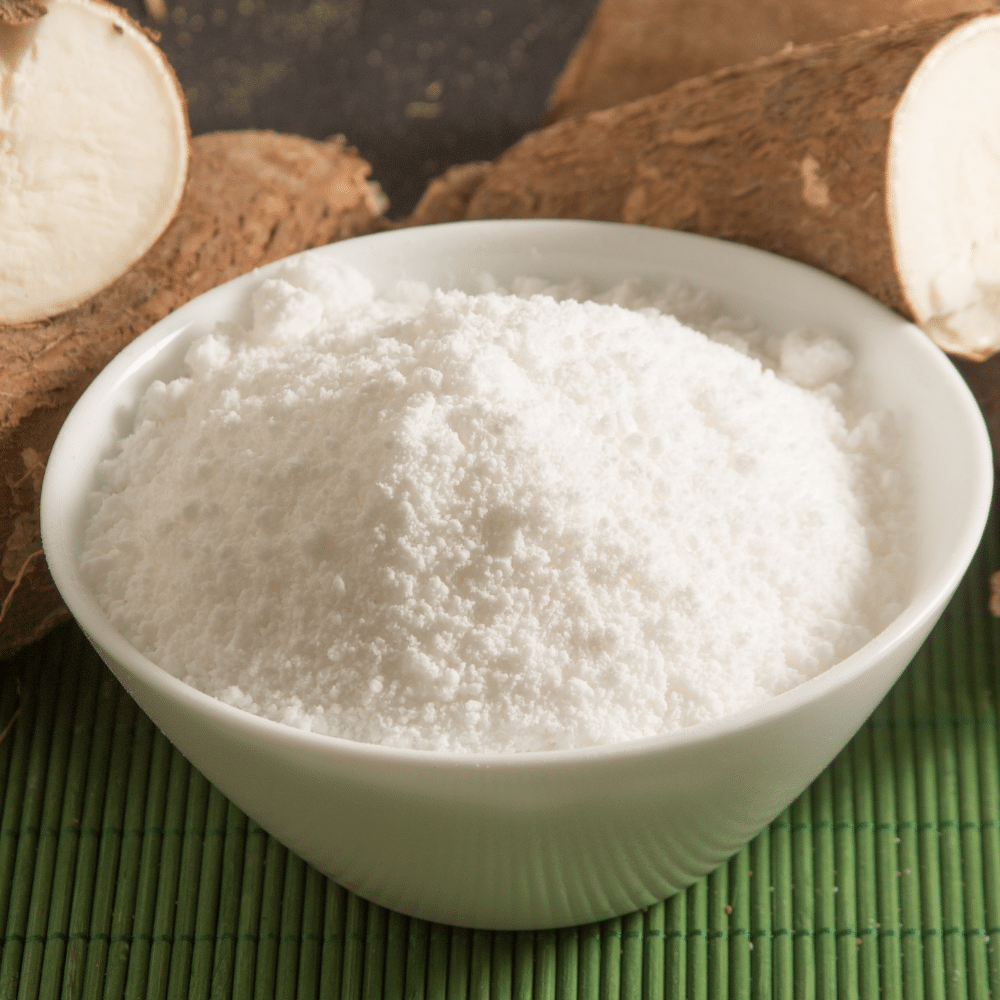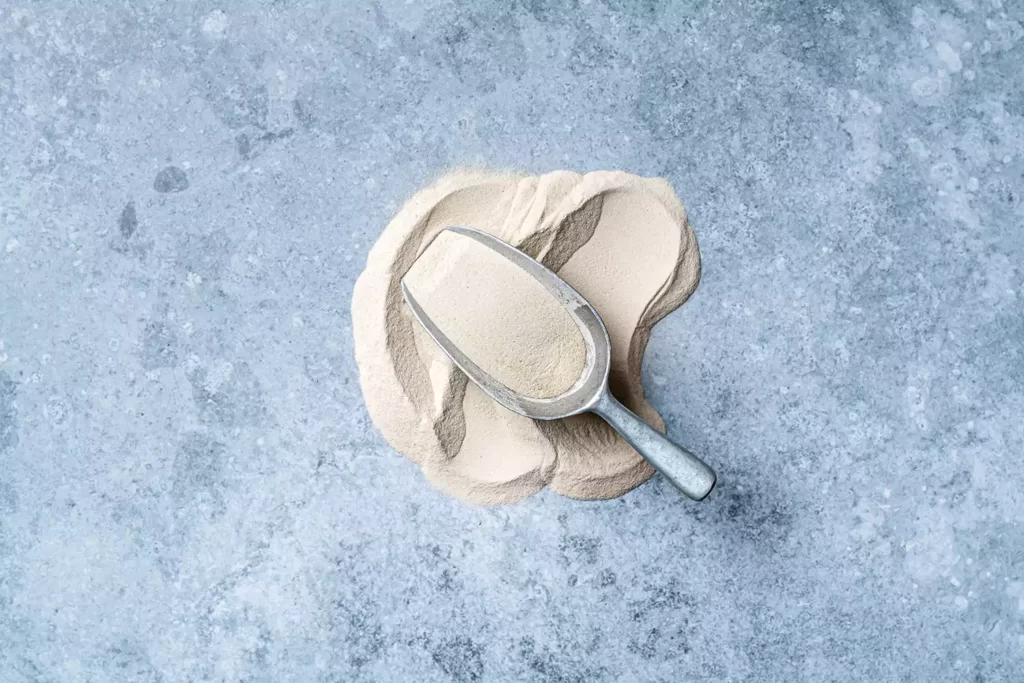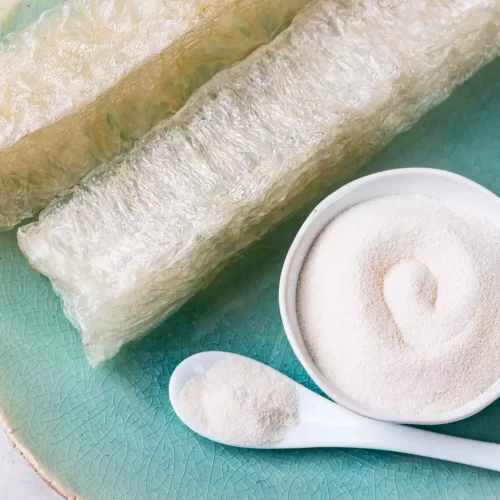Are you looking for a vegan and gluten-free alternative to gelatin?
Agar agar is the perfect choice.
Agar agar, also known as kanten, is a seaweed derivative that has been used in East Asian cooking for centuries.
It’s often used as a thickener or stabilizer in desserts like puddings and custards, but it can also be used to make savory dishes like jellied salads and soups.
But what happens when you don’t have access to agar agar?
Don’t worry – there are plenty of alternatives out there that can help you get the same results without having to sacrifice flavor or texture.
Here are eight of the best substitutes for agar agar that will help you create delicious dishes without breaking the bank.
What is Agar Agar?

Agar agar is a vegan-friendly, plant-based gelatin substitute made from red algae.
It’s odorless and flavorless, but has a jelly-like texture when dissolved in hot water and cooled.
Agar agar is commonly used as a gelling agent in desserts such as puddings, custards, jellies, mousses, cakes and ice cream.
It can also be used to make savory dishes like eggless omelets or cheese substitutes.
Agar agar comes in two forms: flakes and powder.
The flakes are more common for home cooks while the powder form is often used by professional chefs because it dissolves faster than the flakes do.
To use either form of agar agar you must first dissolve it in boiling water before adding it to your recipe; otherwise, it will not gel properly.
Once dissolved, the mixture should be brought back up to a boil before being added to other ingredients or poured into molds for setting.
Agar agar sets at room temperature so no refrigeration is required after setting; however, if you want your dish to set quickly then you can place it in the refrigerator or freezer until set (this usually takes about 30 minutes).
Agar agar has many health benefits including being high in fiber.
The 8 Best Substitutes For Agar Agar
Agar agar is a great vegan alternative to traditional gelatins, but it can be hard to find in some places.
If you’re looking for an alternative, here are eight substitutes that will still provide the same texture and flavor:
1. Cornstarch

Cornstarch is an excellent alternative to agar agar when you need a thickening agent for your recipe.
Cornstarch works best when mixed with cold water before adding it to hot liquids; this helps prevent lumps from forming.
When added to boiling liquid, cornstarch will thicken quickly and form a glossy gel that holds up well in baking applications like pies and tarts.
2. Arrowroot Powder

Arrowroot powder is a starch derived from the rhizomes of several tropical plants.
It is used as a thickening agent in cooking and baking, and can be used as an alternative to agar agar.
Arrowroot powder has a neutral flavor, making it ideal for use in sweet or savory dishes. It also has a light texture that won’t weigh down your recipes like some other thickeners can.
Plus, it’s gluten-free so it’s perfect for those with dietary restrictions!
Pro Tip: When using arrowroot powder as an alternative to agar agar, you’ll need to use twice the amount of arrowroot powder compared to agar agar. So if your recipe calls for 1 teaspoon of agar agar, you’ll need 2 teaspoons of arrowroot powder instead!
3. Tapioca Starch

Tapioca starch, also known as tapioca flour, is a white powder made from the root of the cassava plant.
Read Also: 15 Best Cassava Cake Toppings: Find Your Cassava Topping
It’s a popular ingredient in many recipes and has a mild flavor that makes it ideal for use in sweet or savory dishes.
Tapioca starch is an excellent thickening agent because it forms a gel when heated with liquid.
This makes it perfect for creating sauces, puddings, custards, and other creamy dishes. It can also be used to make gluten-free breads and pastries that are light and fluffy.
Pro Tip: Tapioca starch works best when mixed with cold liquids before being added to hot liquids. This helps prevent lumps from forming and ensures your dish will have a smooth texture!
4. Pectin Powder

Pectin powder is a natural thickening agent derived from the cell walls of fruits and vegetables. It is commonly used in jams, jellies, and other preserves to give them their signature texture.
Pectin powder can also be used as a vegan substitute for gelatin in recipes such as mousses and custards.
Pectin powder has a neutral flavor that won’t alter the taste of your dish, but it does have an acidic component which helps it to thicken more quickly than agar agar.
When using pectin powder, you’ll need to add sugar or another sweetener to help activate its thickening properties.
Pro Tip: To get the most out of your pectin powder, make sure you mix it with cold liquid before adding it to hot dishes like jams or sauces. This will ensure that the pectin dissolves completely and doesn’t clump up!
5. Xanthan Gum

Xanthan gum is a polysaccharide derived from the bacteria Xanthomonas campestris.
It is used as a thickening agent, stabilizer, and emulsifier in many foods and other products such as toothpaste, lotions, and cosmetics.
Xanthan gum has a unique ability to form strong gels at low concentrations, making it an ideal ingredient for creating creamy textures without adding fat or calories.
It also helps to bind ingredients together and prevent separation.
Pro Tip: When using xanthan gum in recipes that call for agar agar, use half the amount of xanthan gum as you would agar agar. For example if the recipe calls for 1 teaspoon of agar agar then use only ½ teaspoon of xanthan gum instead!
6. Guar Gum

Guar gum, also known as guaran, is a galactomannan polysaccharide extracted from the ground endosperm of the guar plant.
It is used in food products as a thickener and stabilizer.
Guar gum has many advantages over other thickeners such as agar agar.
It can be used to thicken liquids without heating them, it does not require refrigeration, and it can withstand high temperatures without breaking down.
Additionally, it has a neutral flavor so it won’t alter the taste of your dish.
Pro Tip: Guar gum should always be added to cold or room temperature liquids before they are heated up – this will ensure that the thickening effect takes place properly!
7. Carrageen Powder
https://www.pinterest.com/pin/158751955606482989/Carrageen powder is a natural thickening agent derived from red seaweed.
It is commonly used as a vegan alternative to gelatin and agar-agar, and it has the ability to thicken liquids without altering their flavor.
Carrageen powder can be used in a variety of recipes such as puddings, custards, sauces, soups, and more.
Carrageen powder has many health benefits including being high in fiber which helps promote healthy digestion.
It also contains essential minerals like calcium, magnesium, potassium, iron and zinc that are important for overall health.
Additionally, carrageen powder is low in calories making it an ideal ingredient for those looking to watch their weight or maintain a balanced diet.
8. Vegan Jel
Vegan Jel is a plant-based alternative to agar agar, a gelatinous substance derived from seaweed.
It is made from carrageenan, an extract of red algae that has been used for centuries as a thickener and stabilizer in food products.
Vegan Jel can be used as a substitute for traditional gelatin in recipes such as jellies, custards, mousses and more.
Vegan Jel has the same properties as agar agar but with the added benefit of being vegan friendly.
It sets quickly at room temperature and does not require refrigeration like traditional gelatin does. It also has no taste or smell so it won’t affect the flavor of your dish.
Vegan Jel is easy to use and can be found in most health food stores or online retailers.
FAQ
Can I substitute agar agar with cornstarch?
Yes, you can substitute agar agar with cornstarch, but bear in mind that agar agar and cornstarch have quite different properties and will yield different results.
Agar agar is a flavorless, odorless gelatin that comes from red seaweed, while cornstarch is a starch derived from corn.
To substitute one for the other, use a 1:1 ratio, meaning that for every 1 tablespoon of agar agar, use 2 tablespoons of cornstarch. Keep in mind, however, that the texture and consistency of the finished product will be different with this substitution.
Can I replace agar with gelatin?
Yes, agar can be substituted for gelatin in most recipes. Agar and fruit pectin are two of the most popular vegetarian alternatives to gelatin, as they are both derived from natural sources.
Agar is a type of seaweed extract that is processed into powder, flakes, or bars and is usually sold in health food stores.
It is a great substitute for gelatin as it can provide the same thickening and gelling properties, but without the animal-based ingredients. However, it does not have the same melting point as gelatin, so you may need to adjust the recipe accordingly.
Is agar agar powder the same as xanthan gum?
No, agar agar powder and xanthan gum are not the same. Agar agar powder comes from a type of seaweed, while xanthan gum is made from bacterial fermented sugar.
They both have thickening properties, but agar agar powder will solidify your recipe and make it gel-like, whereas xanthan gum will not. Xanthan gum is a popular substitute for agar agar powder, as it will still help thicken the recipe and keep it from separating.
Conclusion
In conclusion, agar agar is an incredibly versatile ingredient that is used in a variety of recipes.
However, if you don’t have any on hand, there are still plenty of alternatives that can be used as a substitute.
The best substitutes for agar agar are cornstarch, arrowroot powder, tapioca starch, pectin powder, xanthan gum, guar gum, carrageen powder, and vegan jel. Each of these ingredients can be used in place of agar agar and will help to thicken and bind your dishes.
So, the next time you’re in a pinch and need a substitute for agar agar, try one of these options and see what works best for you.

The 8 Best Substitutes For Agar Agar
Ingredients
- Cornstarch
- Arrowroot Powder
- Tapioca Starch
- Pectin Powder
- Xanthan Gum
- Guar Gum
- Carrageen Powder
- Vegan Jel
Instructions
- Pick your favorite substitute from the list above.
- Follow cooking directions for your selected substitute with the proper ratio of ingredients.
Jenny has always been passionate about cooking, and she uses her platform to share her joy of food with others. Her recipes are easy to follow, and she loves giving tips and tricks to help others create their own unique culinary creations.

